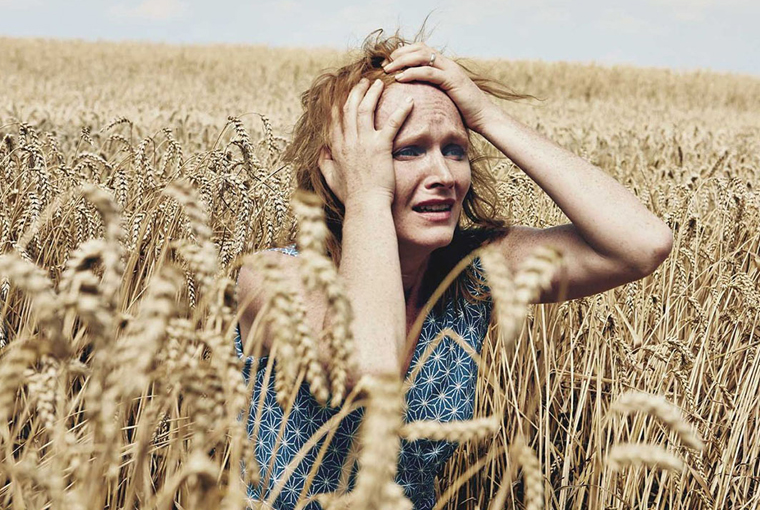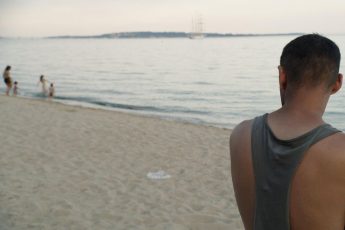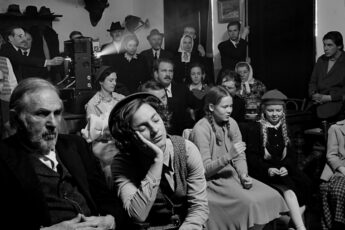Ask Not For Whom the Bell Tolls
Jiří Sádek’s The Noonday Witch (Polednice, 2016)
Vol. 68 (October 2016) by Zoe Aiano
The latest in a long line of Czech and Slovak directors to continue the tradition of adapting local folktales for screen, Jiří Sádek found inspiration for his first feature in the demonic figure of the “Polednice” or Noonday Witch. This age-old hag falls into the category of monstrous beings used to scare people into obeying rules, and her primary role in this regard was to stop children playing in cornfields, where they would potentially damage the crops and risk heat stroke. However, the Noonday Witch has lived on most famously in a poem by Karel Jaromir Erben, a nineteenth century collector of lore who included it in his book of proto folk-horror tales Kytice, which was also made into a film in 2000 by F. A. Brabec.
Like the other intellectuals who took an interest in folklore during the time of the so-called cultural awakening, Erben was motivated by an ideological agenda and his stories were essentially intended as morality tales. His particular brand of morality was highly conservative, largely fixated on the family unit and often concerned with the perils of upsetting the natural order. Women in particular do not come off well, and are always invoking havoc with their reckless impulsiveness and emotional over-indulgence. Such is the case for his version of the Noonday Witch story, which sees a tetchy mother threaten her child with the mythical crone, only to have her really appear. In a twist straight out of a psychological horror, in her panic the mother ends up smothering the boy herself and the father comes home to find her cradling their dead infant in her arms.
On paper, the idea to convert the story into a thriller set present day Bohemia is logical. Bristling gold cornfields and oppressive heat are the classic stuff of horror, a genre that does not generally turn its nose up at the re-use of cliché imagery. Yet while all the ingredients are there, they’re just not used to their full effect. The cinematography and acting are both standard and fairly uninteresting, although child star Karolína Lipowská probably steals the show with regard to the latter. Yet by far the biggest failing is the plot, which quite impressively manages to be both predictable and completely illogical.
In the middle of a drought, recently widowed Eliška (Anna Gieslerová) relocates to her deceased husband’s rural home town with her young daughter Anetka (Lipowská), determined to start a new life. She hasn’t been able to bring herself to break the news of her father’s death to Anetka, and maintains that he’s simply away on business. Thanks to the intervention of a meddling neighborhood child, the girl eventually comes to find out for herself and a rift of resentment develops between them. Meanwhile, they get to know the inhabitants of the small town one by one (all five of them), including the unsubtly lecherous handyman Zdeněk Poláček (Jiří Strébl) and, most importantly, the mayor’s crone-like wife (Daniela Kolářová), who has the groan-inducing name of Anežka Mrazová (“Frosty”).
Anežka develops a habit of sneaking into Eliška’s home late at night and uttering foreboding–laden pronouncements about a creature that takes children and never gives them back. Further delving into the subplot reveals that Anežka in fact killed her own child during a similarly blistering summer, and maintains that the responsible party was not in fact her but rather the Noonday Witch, who she herself embodies by drifting through the fields as the church bells strike twelve. Eliška becomes fixated with the idea and begins to hear voices and experience visions of a witch that increasingly takes on elements of her own appearance. She barricades herself and her daughter in the house, but of course to no avail as the real threat is from within. Eventually Anetka runs away from her mother’s crushing grasp and into the cornfield, and as luck would have it at that very moment an eclipse takes place, restoring her sanity and restoring normality. Perhaps most gratingly, this completely illogical conclusion is justified by means of a bedtime story where the sun steals a child and the moon brings him back, which is repeated over and over. This device is so blatant that the ending is obvious from practically the very beginning, meaning that the whole duration of the film is spent in the expectation of being disappointed.
On the whole, the tension and narrative structure of the cinematic adaptation fails to live up to the pared down punch of Erben’s original 12 stanzas. The stifling heat wave, for example, is discussed a lot but doesn’t really come through in the mise en scène and as such makes little contribution to the atmosphere. In terms of the dramaturgy, the film plays the “monster within” card way too early, so not only does it not come as a shock but also isn’t developed enough to elicit any curiosity. The witch herself, when she is finally revealed, bears a distressing resemblance to a school art project, and would definitely have been better left to the imagination.
Where the film perhaps surpasses its source of inspiration is in the ridiculousness of its moralizing. While Erben’s mother is punished for irresponsible parenting, Sádek goes further and seems to suggest that women are incapable of living alone, as if the Noonday Witch were some kind of hysterical manifestation induced by the absence of men. Anežka Mrazová’s husband, played by Zdeněk Mucha, claims culpability for the death of their child on the grounds of having been too occupied by his work, while Eliška constantly reiterates her ineptitude, irrational decisions and lack of basic skills. Whether intended as an attack on those who deviate from the traditional family unit, a health warning for women against exposing themselves to extreme temperatures lest their hormones explode, or simply as the lazy cobbling together of a mish-mash of clichés, The Noonday Witch has a lot to learn about constructing a story and maintaining interest.




Leave a Comment